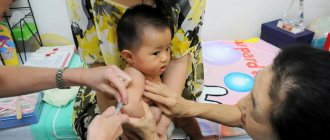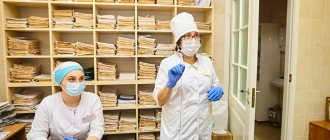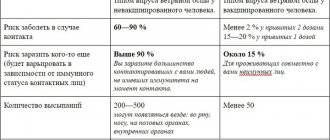Life and health - what could be more valuable? In the modern world you can buy anything, but health and life, unfortunately, you cannot. Our health is unique and therefore priceless. You must treat your health extremely carefully and seriously, take care of it and avoid situations that could lead to its undermining or weakening. One of the most important aspects of caring for life and health is prevention, including immunoprophylaxis of viral diseases. For medical workers, such protection is most relevant, because employees of medical organizations come face to face with various diseases and viruses every day.
In this article, we will try to understand what exactly this type of immunoprevention of viral diseases as vaccination is, determine the degree of its importance for employees of medical organizations, as well as the legal aspects associated with it.
Medical worker concept
According to paragraph 13 of Art. 2 Federal Law of November 21, 2011 No. 323-FZ “On the fundamentals of protecting the health of citizens in the Russian Federation” (hereinafter referred to as Federal Law No. 323), we can consider a medical worker to be an individual who has a medical or other education, works in a medical organization and in labor ( whose official responsibilities include the implementation of medical activities, or an individual who is an individual entrepreneur directly engaged in medical activities.
Vaccination concept
In accordance with Art. 1 Federal Law “On immunoprophylaxis of infectious diseases” dated 17.09. 1998 No. 157-FZ (as amended on December 31, 2014) (hereinafter referred to as Federal Law No. 157), vaccination or prophylactic inoculation is considered to be the introduction of immunobiological drugs into the human body for immunoprophylaxis in order to create specific immunity to infectious diseases. In non-medical terms, a vaccination is the introduction of a weakened “version” of the virus to a person in order to develop immunity to the disease.
The importance of vaccination for healthcare workers
As mentioned above, carrying out preventive vaccinations for employees of medical organizations is extremely important and relevant. Strong immunity is a kind of armor for the body. Medical workers, due to the specifics of their work, need especially strong, unshakable health protection. Antiviral vaccinations provide such protection effectively. However, it cannot be said that any preventive measure must be timely. The same applies to vaccinations.
Legal regulation of vaccination
Preventive vaccinations are carried out in accordance with 2 procedures specified in Federal Law No. 157, namely:
- within the framework of the national calendar of preventive vaccinations;
- according to epidemic indications.
Thus, in order to prevent viral diseases in the Russian Federation, according to Art. 9 Federal Law No. 157, a national calendar of preventive vaccinations has been established. Its legislative concept is contained in Art. 1 of the same law. The national calendar of preventive vaccinations should be understood as a regulatory legal act that establishes the timing and procedure for carrying out preventive vaccinations for citizens.
In turn, Art. 10 Federal Law No. 157 establishes vaccination according to epidemic indications. Preventive vaccinations for epidemic indications are carried out to citizens when there is a threat of infectious diseases, the list of which is established by the Ministry of Health of the Russian Federation. The legislator has not given the legal concept of “epidemic indications,” however, this term should be understood as the spread or threat of spread of viral diseases among the population.
A distinctive feature of preventive vaccinations carried out according to epidemic indications is their administration to people at high risk of infection as soon as possible before the expected rise in incidence, for example, medical workers, epidemiologists.
Professions for which vaccination is mandatory
Medical workers must be vaccinated, since their work is associated with an increased risk of infection.
The government (Decree No. 825 of July 15, 1999) established which specific jobs are associated with a particular risk of infection, including which categories of health workers are required to be vaccinated against specific diseases.
Medical activities include the following:
- with infectious patients;
- with live cultures of infectious agents;
- with contaminated fluid and human blood.
To be allowed to work, health workers must be vaccinated according to age and epidemiological indications, especially those who come into contact with human blood:
- medical staff of departments and services of donors and blood, kidney transplants, hemodialysis departments, laboratories;
- all medical and medical (mid-level and junior) personnel in the surgical, obstetric-gynecological, anesthesiological, dental, urological, therapeutic, and infectious disease departments;
- all emergency medical workers.
National calendar of preventive vaccinations
The national calendar of preventive vaccinations is of priority importance for the prevention of viral diseases among citizens. This regulatory legal act applies to absolutely all categories of citizens. Vaccinations for epidemic indications, on the contrary, are carried out in a certain territory, at a certain time, among a certain group of the population.
A detailed list of vaccinations, the timing of their implementation, as well as the categories of citizens who need compulsory vaccination are established by Order of the Ministry of Health of Russia dated March 21, 2014 No. 125n “On approval of the national calendar of preventive vaccinations and the calendar of preventive vaccinations for epidemic indications.” This national calendar of preventive vaccinations began its operation on May 27, 2014. Until this moment, the Order of the Ministry of Health and Social Development of the Russian Federation dated January 31, 2011 No. 51n “On approval of the national calendar of preventive vaccinations and the calendar of preventive vaccinations for epidemic indications” was in effect. The old calendar contained such a concept as “immunization”, for example, it included immunization against measles and rubella. In addition, the old document did not contain such important preventive vaccinations for the entire population as vaccination against viral hepatitis A, against chickenpox, against pneumococcal infection, against rotavirus infection, against Haemophilus influenzae infection.
As part of the national calendar of preventive vaccinations, a calendar of preventive vaccinations for epidemic indications has been created.
The national vaccination calendar has a clear division of citizens into categories subject to compulsory vaccination, as well as an indication of which vaccinations should be given to which categories.
Thus, from the national calendar of preventive vaccinations, the following vaccinations can be distinguished, which are required for medical workers.
| Preventive vaccinations are mandatory for medical workers | |
| According to the national calendar of preventive vaccinations | According to the Calendar of Preventive Vaccinations for Epidemic Indications (within the framework of the national calendar of preventive vaccinations) |
| Vaccination against diphtheria, tetanus - revaccination every 10 years | Vaccination against viral hepatitis A |
| Vaccination and revaccination against viral hepatitis B | Vaccination against shigellosis |
| Vaccination against measles, revaccination against measles (adults up to 35 years of age (inclusive), who have not been sick, not vaccinated, vaccinated once, who have no information about vaccinations against measles; adults from 36 to 55 years of age (inclusive), belonging to risk groups (including including employees of medical organizations), who have not been sick, who have not been vaccinated, who have been vaccinated once, who have no information about vaccinations against measles | Vaccination against polio |
| Flu vaccination | |
| Vaccination against rubella, revaccination against rubella (women from 18 to 25 years old (inclusive) who have not been sick, not vaccinated, vaccinated once, who have no information about vaccinations against rubella) | |
In addition, persons working with live cultures of the following viruses are also subject to mandatory vaccination: tularemia, plague, brucellosis, anthrax, rabies (“street” rabies), leptospirosis, tick-borne viral encephalitis, Q fever, yellow fever, typhoid fever.
Based on this Order, all employees of medical organizations, as persons exposed to a high probability of viral diseases, must be vaccinated according to the established calendar, as well as in the event of an epidemic threat.
List of mandatory vaccinations for healthcare workers
The national vaccination calendar against infectious and viral diseases is approved by the Ministry of Health on the basis of Federal Law No. 157-FZ dated September 17, 1998. There are separate calendars for children and adults. Additionally, national regional vaccination calendars are being developed depending on the characteristics in the territories of the constituent entities of the Russian Federation. By comparing the two calendars, the organization's management determines whether the nurse must be vaccinated and against what diseases.
In a normal situation, the list for doctors and nurses does not differ from the standard list for other citizens.
As of 2021, the federal calendar includes vaccines collected in the table:
| Disease | For whom vaccination is required (adults) | Frequency of vaccination (re-vaccination) |
| Tetanus | All adult citizens | Once every 10 years |
| Diphtheria | All adult citizens | Once every 10 years |
| Rubella | Those who have not had rubella and were not vaccinated before the age of 18 - until the age of 55 | One time |
| Infectious mumps | Adults, not vaccinated and not sick in childhood, up to 55 years of age | One time |
| Hepatitis B | According to the standards, vaccination of medical workers against hepatitis B is carried out until the age of 55 years, if they were not vaccinated in childhood | According to the scheme |
| Measles | According to the calendar, healthcare workers are vaccinated against measles up to 55 years of age, if the person has not been vaccinated before and has not been sick | 2 times with a break of at least 3 months |
| Flu | All health workers | Annually |
| Hepatitis A | Workers of infectious diseases departments and catering departments | According to epidemiological indications |
| Typhoid fever | Employees who encounter typhoid cultures (sanitation, biohazard disposal) | According to epidemiological indications |
| Plague, tularemia, Q fever, tick-borne encephalitis, brucellosis, rabies, anthrax | Employees working with pathogens | According to epidemiological indications |
IMPORTANT!
All vaccinations from the list are free for citizens and are financed by the compulsory medical insurance program; additional vaccinations, if necessary for work purposes, are paid for by the employer.
Some of the vaccinations included in the national calendar are given only in childhood (tuberculosis, hemophilus influenzae infections). If the deadline is missed, adults remain unvaccinated, and control and preventive measures are applied to such persons.
ConsultantPlus experts examined what threatens an employer if a “pandemic dissident” works for him. Use these instructions for free.
Right of medical workers to vaccination
In Art. 18 Federal Law No. 323 states that everyone has the right to health care.
In accordance with paragraph 1 of Art. 4 Federal Law No. 323, the Russian state ensures compliance with the rights of citizens in the field of health care.
In addition, in Art. 19 of the same law enshrines the right of everyone to medical care. By medical care we mean, in accordance with paragraph 3 of Art. 2 Federal Law No. 323, a set of measures aimed at maintaining and/or restoring health and including the provision of medical services.
Also, in paragraph 2 of part 5 of Art. 19 of the above-mentioned law states that every patient has the right to prevention.
So in paragraph 8 of Art. 4 of Federal Law No. 323 states that prevention in the field of health care has a priority role.
Based on this in Art. 5 Federal Law No. 157 lists the basic rights of citizens when implementing immunoprophylaxis. These include the right to free preventive vaccinations included in the national calendar of preventive vaccinations for epidemic indications in medical organizations of the state health care system and the municipal health care system.
News from the perinatal center
Vaccination during the COVID-19 pandemic: questions and answers for health workers
1. Is it safe to vaccinate children during the COVID-19 pandemic?
Yes. Potential exposure to an infectious disease is not a contraindication for routine immunization 1 . Accordingly, the COVID-19 pandemic does not pose any specific risks associated with vaccination. Routine immunization sessions should continue as much as possible and as the COVID-19 response allows. However, standard infection control measures must be followed to minimize the risk of transmission of COVID-19 among staff and visitors to facilities.
The World Health Organization (WHO) recommends routine vaccinations in accordance with the vaccination schedule even during the COVID-19 pandemic. Particularly important is the vaccination of children, who must receive all the vaccines included in the vaccination schedule at birth and in the first two years of life 2 . These vaccines may vary from country to country depending on national recommendations. If any immunization services have been suspended, they should be resumed as soon as possible and catch-up vaccinations offered 2 . Timely vaccination is critical to ensure that young children are effectively protected from severe, life-threatening infectious diseases and to avoid the accumulation of unvaccinated populations and potential loss of herd immunity1.
2. Does vaccination increase a child's risk of getting or developing COVID-19?
No. There is currently no evidence that vaccination increases a child's risk of contracting COVID-19 or affects the course of the disease. Vaccination against one disease does not weaken a person's immune response to another disease 3,4,5. Moreover, routine vaccination of children during the COVID-19 pandemic will protect them from vaccine-preventable diseases (VPDs). Following proper infection control measures during immunization sessions will minimize the potential risk of children becoming infected with COVID-19.
3. Why is vaccination especially important during the COVID-19 pandemic?
Any interruption in immunization services, even for a short period of time, will place the population, and especially children, at immediate risk of VPV 6 . An increase in the number of susceptible individuals will jeopardize the collective protection of the population and increase the likelihood of VPD outbreaks. Such outbreaks can lead to illness and death, and increase the burden on health systems already under enormous strain from responding to the COVID-19 outbreak.
4. Is it dangerous to vaccinate a child during the incubation period of COVID-19?
No. The general principle, which also applies to COVID-19, is that vaccination does not pose any known risks to a person who has been in contact with an infectious patient or is in the incubation period 1, 7. This means that vaccination will not affect the course of COVID-19 in a child who may have been infected but was not showing symptoms at the time of vaccination, or in a child who may have been infected with COVID-19 shortly after vaccination. Potential infection of a child with COVID-19 will also not affect the safety or effectiveness of the vaccination.
5. Is infection with COVID-19 a contraindication for vaccination?
Although mild symptoms of illness (such as fever and/or cough), which may also occur with COVID-19, are not a clear contraindication to vaccination, 1 it is critical that anyone who tests positive for COVID-19 remain isolated in accordance with national guidelines to prevent infection of others and further spread of the SARS-CoV2 virus.
6. Are there specific vaccines recommended for healthcare workers in the context of COVID-19?
There is currently no vaccine against COVID-19. As of April 11, 2021, 6 vaccine candidates are undergoing clinical trials; 77 other vaccine candidates are in preclinical studies 8 . WHO is working with all stakeholders to ensure that once a safe and effective COVID-19 vaccine becomes available, it is prioritized and distributed equitably. While waiting for such a vaccine, all health care workers should ensure that they are vaccinated against other infectious diseases in accordance with national recommendations, which is especially important during the COVID-19 pandemic 9 .
Additional Information
Guidance on routine immunization during the COVID-19 pandemic in the WHO European Region. https://www.euro.who.int/__data/assets/pdf_file/0005/433814/Guidance-routine-immunization-services-COVID-19-pandemic-rus.pdf?ua=1
Vaccination during the COVID-19 pandemic: questions and answers for parents
1. Should my child be vaccinated during the COVID-19 pandemic?
Yes, it is important that your child receives all routine vaccinations on time; they will protect him from many dangerous diseases now and in the future. Follow the recommendations of your country's health authorities; from them you will learn where and when you can get vaccinated. If immunization services are temporarily suspended in your area due to the COVID-19 response, make sure your child receives any missed doses as soon as immunization services are restored.
2. Is it safe to vaccinate my child during the COVID-19 pandemic?
Yes, your child can be vaccinated. COVID-19 does not pose any specific risk associated with vaccines or vaccination.
3. We were told that due to COVID-19 we should stay home as much as possible. Should my child's vaccinations be delayed until after the pandemic?
No. It is important to continue to keep your child vaccinated as up to date as possible, even during the COVID-19 pandemic. Health authorities are doing their best to keep immunization services running, as immunization is an important part of public health. Additionally, getting the healthiest possible start in life is your child's birthright. In communities where physical distancing has been implemented, public health officials are taking measures to minimize the risk of COVID-19 transmission during immunization sessions, such as by reducing wait times and designating separate areas within the facility. Due to necessity, immunization services may be temporarily suspended; in such cases, catch-up immunization will be offered as soon as the facility returns to normal operations.
4. Will routine immunization vaccines protect my child or me from getting COVID-19?
There is currently no evidence that vaccination against other diseases, such as polio or tuberculosis, can prevent infection with COVID-19 or reduce the severity of symptoms of the disease.
Making sure you and your child have received all routine vaccinations can help protect you and your child from other infectious diseases.
5. Can my child get routine vaccinations if they have a cough or fever (and have not been tested for COVID-19)?
If your child does not feel well, be sure to tell your doctor before taking him to a health care facility. Your doctor will advise you whether you should delay vaccination.
6. What should I do if my child tests positive for COVID-19 but the symptoms are not severe?
While mild symptoms are not necessarily a contraindication to vaccination, it is critical that anyone who tests positive for COVID-19 remains isolated; This will prevent infection of others, as well as further spread of the virus.
7. What should I do if my child is potentially infected with COVID-19 but has no symptoms? Can vaccination negatively affect recovery from infection?
No. Vaccination against one disease does not weaken a person's immune response to another disease. There is no evidence that any routine vaccination increases (or decreases) your child's risk of getting COVID-19 or has any effect on their response to the disease. On the other hand, skipped or delayed vaccinations do pose a serious risk as the child becomes vulnerable to many dangerous vaccine-preventable diseases.
8. Is there a vaccine against COVID-19?
No. COVID-19 is a new disease, and there is no vaccine to prevent it yet. Scientists around the world are working to develop such a vaccine, and WHO is working with all stakeholders to ensure that once a safe and effective vaccine becomes available, it is distributed equitably to all those in need.
Acknowledgment: The WHO Regional Office would like to acknowledge the assistance of the WHO Collaborating Center for Vaccine Safety in preparing the questions and answers.
1. Vaccine safety and false contraindications to vaccination. Study guide. WHO Regional Office for Europe, 2017 (https://www.euro.who.int/__data/assets/pdf_file/0009/351927/WHO-Vaccine-Manual.pdf) (accessed 22 April 2021) . language) 2. Guidance on routine immunization during the COVID-19 pandemic in the WHO European Region (2020). https://www.euro.who.int/__data/assets/pdf_file/0005/433814/Guidance-routine-immunization-services-COVID-19-pandemic-rus.pdf?ua=1 (accessed April 22, 2021 d.) 3 Offit P. Addressing parents' concerns: do multiple vaccines overwhelm or weaken the infant's immune system? Pediatrics, 2002;109:124-9 4 Global Advisory Committee on Vaccine Safety, 6–7 June 2006. Weekly Epidemiological Record, 2006: 28(81):273–284 (https://www.who.int/vaccine_safety/ committee/reports/wer8128.pdf?ua=1) (accessed April 22, 2020) 5 Miller E. Bacterial infections, immune overload, and MMR vaccine. Arch Dis Child, 2003;88: 222-3 6 Takahashi S. Reduced vaccination and the risk of meats and other childhood infections post-Ebola. Science, 2015;347(6227):1240-2. doi: 10.1126/science.aaa3438. PubMed PMID: 25766232; PubMed Central PMCID: PMC4691345. 7 Rubin LG. 2013 IDSA clinical practice guideline for vaccination of the immunocompromised host. Clin Infect Dis 2014;58(3):309-18. 8 Draft landscape of COVID-19 candidate vaccines. World Health Organization, 2020 (https://www.who.int/who-documents-detail/draft-landscape-of-covid-19-candidate-vaccines) (accessed 22 April 2020) 9 Summary of WHO Position Papers – Immunization of Health Care Workers. World Health Organization. (https://www.who.int/immunization/policy/Immunization_routine_table4.pdf) (accessed 22 April 2020)
Mandatory vaccination of medical workers
Today in the Russian Federation there is a certain list of work, the performance of which is associated with a high risk of infectious diseases and requires mandatory preventive vaccinations. This list was established by Government Decree No. 825 dated July 15, 1999 “On approval of the list of works, the performance of which is associated with a high risk of infectious diseases and requires mandatory preventive vaccinations.”
According to this list, the following works can be identified that are clearly related to the functional responsibilities of medical workers. Thus, the following persons are subject to mandatory vaccination:
- working with patients with infectious diseases;
- working with live cultures of infectious disease pathogens;
- working with human blood and biological fluids.
Clause 8.4.1 of the Resolution of the Chief State Physician of the Russian Federation dated February 28, 2008 No. 14 “On approval of sanitary and epidemiological rules SP 3.1.1.2341-08” obliges all medical workers to be vaccinated against hepatitis B upon hiring.
In addition, clause 4.2 of the Resolution of the Chief State Doctor of the Russian Federation dated December 9, 2010 No. 163 “On approval of SanPin 2.1.7.27.90.-10 “Sanitary and epidemiological requirements for the management of medical waste” clearly indicates the mandatory vaccination of personnel working with medical waste, in accordance with the national and regional calendar of preventive vaccinations. Personnel who are not immunized against hepatitis B are not allowed to work with medical waste of classes B and C (epidemiologically hazardous waste and extremely epidemiologically hazardous waste, respectively).
Mandatory vaccination for health workers
The work of doctors is associated with infections. Even in the absence of a pandemic or epidemics, medical workers are constantly at risk of becoming infected, as they are in direct contact with sick people. This is noted in the Decree of the Government of the Russian Federation dated July 15, 1999 No. 825, which indicates which works are associated with the risk of infection. It follows from the document that vaccination is mandatory for medical staff based on age and special indications.
Additional vaccines are given to employees who, during their work, encounter:
- with human blood and preparations made from it;
- with pathogens of infectious diseases;
- with infectious patients.
If necessary due to changes in the epidemiological situation, the list of mandatory vaccinations is expanded. Thus, from June 15, 2021, in many regions of the Russian Federation, vaccination against COVID-19 was included in it; now vaccination for doctors is mandatory in the following regions of the Russian Federation:
- Moscow;
- Moscow region;
- Kemerovo region;
- Sakhalin region;
- St. Petersburg;
- Leningrad region;
- Nenets Autonomous Okrug;
- Nizhny Novgorod region;
- Republic of Bashkortostan;
- Khabarovsk Territory;
- Tver region;
- Murmansk region.
In Moscow, mandatory vaccination has been introduced for medical workers and a number of other citizens by Decree of the Chief State Sanitary Doctor for the city of Moscow dated June 15, 2021 No. 1. In the capital, almost all medical employees must be vaccinated by August 15, 2021; vaccination is provided for 60% of employees of medical institutions in two components vaccines.
Read more - “In which regions of the Russian Federation has mandatory vaccination against COVID-19 been introduced.”
IMPORTANT!
Refusal to be vaccinated against coronavirus infection without contraindications will be grounds for removal from work.
Refusal of a medical worker to vaccinate
Based on the above Resolutions, as well as in accordance with the provisions of the National Preventive Vaccination Calendar, it becomes clear that all medical employees are subject to mandatory vaccination. However, we should not forget about the right of every citizen to refuse preventive vaccinations in accordance with Art. 5 Federal Law No. 157, however, such a refusal can lead to very negative consequences. For detailed information on this issue, read our article “Refusal of vaccination by a medical worker.”
Responsibility for administering vaccinations to health care workers
We have already found out that vaccinating medical workers is not just important, but necessary. However, the question quite reasonably arises: who should organize and ensure preventive vaccinations for health workers? The workers themselves or the employers?
To receive a preventive vaccination, a citizen must give informed voluntary consent to medical intervention.
Follow us
Subscribe to the newsletter and be the first to receive the latest and most relevant information from the Faculty of Medical Law.
By submitting an application, you agree to the terms of processing and use of personal data.
By medical intervention we can understand, on the basis of Art. 2 Federal Law No. 323, performed by a medical worker in relation to a patient, affecting the physical or mental condition of a person and having a preventive, research, diagnostic, therapeutic, rehabilitation focus, types of medical examinations and/or medical manipulations (vaccination, in turn, refers to medical manipulation).
In Part 1. Art. 20 Federal Law No. 323 states that a necessary precondition for medical intervention is the giving of informed voluntary consent of a citizen or his legal representative to medical intervention on the basis of complete information provided by a medical worker in an accessible form about the goals, methods of providing medical care, associated risks, possible options medical intervention, its consequences, as well as the expected results of medical care.
Part 7 of the above article also states that informed voluntary consent to medical intervention is formalized in writing, signed by the citizen, as well as by a medical professional, and is contained in the patient’s medical documentation.
Order No. 19n of the Ministry of Health and Social Development of Russia dated January 26, 2009 approved a sample of voluntary informed consent for preventive vaccinations for children or refusal of them. This sample reflects all legal aspects of preventive vaccinations and refusal of them and can be adapted and used for the adult population.
Responsibility for ensuring vaccination of workers
As for the employer, Art. 212 of the Labor Code of the Russian Federation dated December 30, 2001 No. 197-FZ (as amended on December 31, 2014) states that the responsibility for ensuring safe conditions and labor protection rests with the employer. Labor protection, on the basis of Art. 209 of the Labor Code of the Russian Federation, we consider a system for preserving the life and health of workers in the process of work, which includes legal, socio-economic, organizational, technical, sanitary and hygienic, treatment and preventive, rehabilitation and other measures.
So, in Part 1 of Art. 223 of the Labor Code of the Russian Federation states that sanitary, household and medical provision of workers in accordance with labor protection requirements is the responsibility of the employer.
In addition, in Art. 11 Federal Law dated March 30, 1999 No. 52-FZ (as amended on December 29, 2014) “On the sanitary and epidemiological welfare of the population” states that individual entrepreneurs and legal entities, in accordance with the activities they carry out, are obliged to develop and carry out sanitary and anti-epidemic (preventive) measures .
Also, in the Decree of the Chief State Sanitary Doctor of the Russian Federation dated April 30. 2003 No. 82 (ed. 06/10/2003) “On the implementation of sanitary and epidemiological rules SP 3.1.2.1319-03” Prevention of infectious diseases. Prevention of influenza, it is said that compliance with sanitary rules is mandatory for citizens, legal entities and individual entrepreneurs, regardless of departmental affiliation and forms of ownership.
Thus, we can conclude that the obligation to provide vaccinations for medical workers is the direct responsibility of the employer, including the financing of these activities.
Responsibility for refusing vaccinations
For health workers, vaccination and revaccination are required, as provided for by regulations, for example, revaccination of health workers against hepatitis B is carried out 12 months after the initial vaccination.
But health workers have the right to refuse vaccination on the basis of clause 1 of Art. 5 Federal Law of September 17, 1998 No. 157-FZ “On the immunoprophylaxis of infectious diseases.” It does not matter whether the nurse is required to be vaccinated if she takes advantage of this option of refusal. But management has the right to transfer her to another job or remove her from work due to a health hazard.
If an employee has medical contraindications, he provides the appropriate medical report.
All medical workers must be vaccinated according to the national vaccination calendar, including for epidemiological reasons. Refusal (including for medical reasons) entails mandatory removal from work, and for the applicant - refusal to hire.
The removal of an employee from work is carried out in accordance with Art. 76 of the Labor Code of the Russian Federation without pay until vaccination. With the consent of the employee, he is transferred to another position that does not require mandatory immunization against a specific infection.
Considering the importance of vaccination among health workers and the population for the prevention of diseases, responsibility has been established for employers for allowing unvaccinated employees to work.
If an employer allows an employee to work without vaccinations, then he bears administrative responsibility under Part 3 of Art. 5.27.1 of the Code of Administrative Offenses of the Russian Federation in the form of a fine:
- 15,000-25,000 rubles - for an official;
- 15,000-25,000 rubles - for individual entrepreneurs;
- 110,000-130,000 rubles - for a legal entity.
IMPORTANT!
The fine is paid for each unvaccinated employee and is summed up according to the number of violations detected!
For failure to comply with the requirements of the chief sanitary doctor, employers will be held administratively liable under Article 6.3 of the Code of Administrative Offenses of the Russian Federation (in Moscow, additionally under Article 3.18 of the Moscow Code of Administrative Offenses). The fine for violation is:
- for officials and individual entrepreneurs - from 30,000 to 50,000 rubles;
- for organizations - from 100,000 to 300,000 rubles.
In case of harm to health or repeated violation, the fine increases significantly:
- for officials - from 300,000 to 500,000 rubles;
- for legal entities and individual entrepreneurs - from 500,000 to 1 million rubles or suspension of activities for up to 90 days.
List of regulatory legal acts:
- Labor Code of the Russian Federation dated December 30, 2001 No. 197-FZ;
- Federal Law of November 21, 2011 No. 323-FZ “On the fundamentals of protecting the health of citizens in the Russian Federation”;
- Federal Law of September 17, 1998 No. 157-FZ “On Immunoprophylaxis of Infectious Diseases”;
- Federal Law of March 30, 1999 No. 52-FZ “On the sanitary and epidemiological welfare of the population”;
- Order of the Ministry of Health of Russia dated March 21, 2014 No. 125n “On approval of the national calendar of preventive vaccinations and the calendar of preventive vaccinations for epidemic indications”;
- Government Decree No. 825 dated July 15, 1999 “On approval of the list of works, the performance of which is associated with a high risk of infectious diseases and requires mandatory preventive vaccinations”;
- Resolution of the Chief State Physician of the Russian Federation dated February 28, 2008 No. 14 “On approval of sanitary and epidemiological rules SP 3.1.1.2341-08 “Prevention of viral hepatitis B. Sanitary and epidemiological rules”;
- Resolution of the Chief State Doctor of the Russian Federation dated December 9, 2010 No. 163 “On approval of SanPin 2.1.7.27.90.-10 “Sanitary and epidemiological requirements for the management of medical waste”;
- Resolution of the Chief State Sanitary Doctor of the Russian Federation dated November 18, 2013 No. 63 “On approval of sanitary and epidemiological rules SP 3.1.2.3117-13 “Prevention of influenza and other acute respiratory viral infections.”
WHAT ARE THE OBLIGATIONS OF AN EMPLOYER
Employers are required to organize preventive vaccinations for their employees. This is exactly the wording that appears in almost all decisions of the chief sanitary doctors of the regions:
Extraction
from the Resolution of the Chief State Sanitary Doctor for the Sakhalin Region dated June 18, 2021 No. 204 [1]
[…]
6. Heads of organizations, individual entrepreneurs operating in the Sakhalin region, in the areas established by paragraph 5 of this Resolution:
6.1. ensure the transfer to remote work of unvaccinated workers from among citizens over 65 years of age, as well as citizens with chronic diseases (cardiovascular diseases, respiratory diseases, diabetes);
6.2. by 07/20/2021, organize preventive vaccinations [2] with the first component or a single-component vaccine, and by 08/20/2021 with the second component of the vaccine against the new coronavirus infection, which has passed state registration in the Russian Federation, for at least 60% of the total number of employees; ensure awareness-raising work among employees on the prevention of new coronavirus infection (COVID-19), paying special attention to the need for preventive vaccinations.
[…]
That is, the employer’s organizational function:
• explain to employees the purposes of vaccination, emphasizing the need for preventive vaccinations;
• inform about the process and timing of vaccination;
• warn about possible adverse consequences if you refuse vaccination (and then ensure these consequences);
• provide the opportunity to visit vaccination points or organize the arrival of a medical team at the enterprise;
• provide a report to authorities on the number of vaccinated people (not in all regions).
On July 23, 2021, the Russian Ministry of Labor and Rospotrebnadzor published joint clarifications[3] on the organization of vaccination in organized work collectives (labor collectives) and the procedure for recording the percentage of vaccinated people (hereinafter referred to as the Joint clarifications). The departments recommended that employers organize explanatory work among the workforce, namely:
• disseminate information officially posted on the websites of the Russian Ministry of Health, Rospotrebnadzor and the authorities of a constituent entity of the Russian Federation about the current epidemiological situation in the region regarding COVID-19 and the effectiveness of vaccination;
• use the personal positive experience of employees who have been vaccinated;
• provide employees with information about the vaccines used, stationary and mobile vaccination points.
The employer cannot be obligated to provide vaccination. Everything that relates to the process of administering the vaccine itself, including the collection of voluntary consents or refusals, is the responsibility of physicians[4]. The implementation of immunoprophylaxis is provided by the Ministry of Health of Russia, Rospotrebnadzor, as well as government authorities of subjects in the field of healthcare[5].








